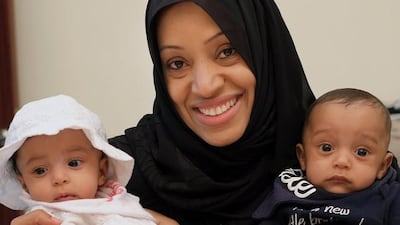ABU DHABI// Zakeya Al Ameri is waiting for the day her nine-month-old twins start calling her “mama” and her husband “baba”.
She is so worried that she has already sought the help of a speech therapist who has advised certain exercises.
She is not alone in her concerns, however, because experts say language, speech and learning disorders are affecting many children in the country.
Dr Ahmad Almai, head of child psychiatry at Sheikh Khalifa Medical City, said that 7 per cent of UAE children have learning, speech and language disorders.
Recent data from the US and UK, however, put the percentage of children in those countries with these disorders at about 3 per cent.
Dr Almai, who was speaking at the Bright Start conference, blamed the UAE's high figures on several factors.
First, he said, it could be caused by genetics as a result of the proportion of intermarriages in the country.
Second, using domestic helpers who do not speak the family’s language can impede language development.
“Another thing that is plaguing families here is the use of electronic devices,” Dr Almai said.
“Children are not going to learn language and social skills from these gadgets.
“People feel very happy that their child is one or two years old and he can operate an iPad.
“But he is missing out on social skills or life skills he will learn from family and peers.”
Ms Al Ameri is the mother of two sets of twins – Mohammed and Maryam, 5, and Ali and Fatima, who are nine months old.
Mohammed and Maryam have been looked after by Ethiopian and Filipino helpers, which Ms Al Ameri believed had affected her children’s language abilities.
“The maids were interested in learning Arabic and spoke in broken Arabic. They spent more time with the children because we were working. The children’s Arabic and English was very poor. I was concerned when they went to school and gave tests,” Ms Al Ameri said.
The Emirati government worker has now set new house rules and does not allow her maids to talk to the children in Arabic.
Suha Al Shuaibat, a Jordanian speech and language pathologist at the Camali Clinic, also blamed lifestyle choices for the increase in children suffering from speech problems.
“Children don’t have a chance to communicate and socialise with other children and they don’t know how to play. There is no model for them to acquire the language. The delay in picking up language is because we don’t provide a good model,” she said.
She said that children could learn two or three languages before the age of six.
“Use full sentences in English or Arabic but don’t mix the two languages,” she said.
Noura Al Khoori, an Emirati mother of three, said some of her extended family’s children picked up broken English and broken Arabic from helpers. “By the time they are five or six they have no language and when you speak to them you don’t know where they are from,” Ms Al Khoori said.
She ensures that her children practised reading or writing Arabic every day.
arizvi2@thenational.ae


